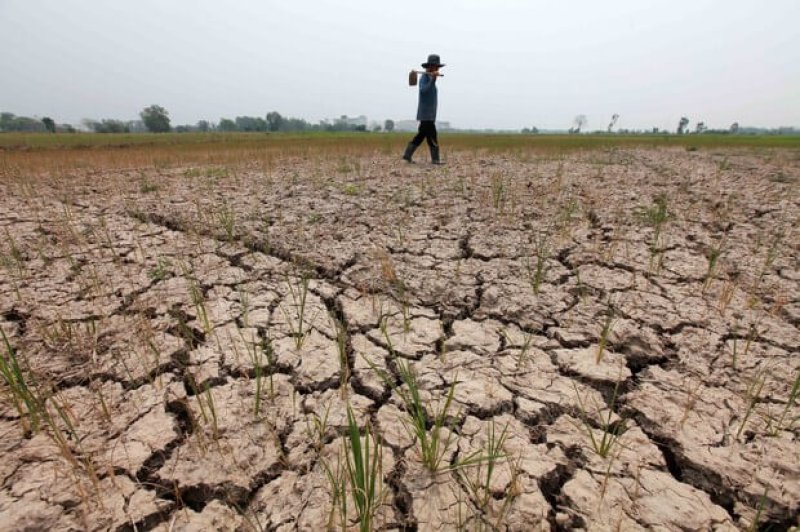The effects of climate change are becoming increasingly severe in sub-Saharan Africa, where millions of people are facing severe food shortages due to drought.
A “catastrophic” combination of drought and communities’ declining resilience has left an estimated 2.3 million people facing severe acute food insecurity in Zambia alone, according to the International Federation of Red Cross (IFRC). That’s up from an estimated 1.7 million people just a month ago.
Some families in the worst-affected areas are surviving the food shortage by eating wild fruits and roots, a coping mechanism that exposes them to poisonous species that may be life-threatening or pose serious health risks.
Communities across southern Africa have been affected by drought since late 2018, the agency said in a press release. Large parts of southern and western Zambia received their lowest seasonal rainfall totals since at least 1981, the base year from which normal rainfall is benchmarked, while the northern and eastern parts of the country were affected by flash floods and waterlogging, resulting in poor harvests.
Though the IFRC is raising funds to provide immediate food assistance, the grim news underscores the need for long-term solutions to ensuring food security in the face of climate change. Many African scientists have identified genetically engineered “climate-smart” crops as an important tool for keeping the continent’s population fed.
Biotechnology has the potential to reshape agricultural policies in Africa by addressing both climate change and food and nutritional security, said Benjamin Ubi, president of the Biotechnology Society of Nigeria (BSN), during the group’s annual convention.
Dr. Yemi Akinbamijo, executive director of the Forum for Agricultural Research in Africa (FARA), agreed. “The role of biotechnology towards achieving food and nutrition security in Africa cannot be overemphasized,” he said.
African scientists have developed both GM and hybrid varieties of drought-tolerant maize and are continuing to test an insect-resistant, drought-tolerant maize variety known as TELA in Ethiopia, Mozambique, Nigeria, Uganda, Tanzania and Kenya. It has already been adopted in South Africa.
Additional research is under way on NEWEST rice, which has been engineered to require less nitrogen fertilizer, tolerate drought conditions and grow in salty soils — while still giving good yields.
Biotechnology has been proven and GM crops being grown by millions of farmers across the world, according to Dr. Stephen Mugo, regional representative for Africa and country representative for Kenya CIMMYT. “We would really like it to benefit the resource-poor farmers.”
However, some African countries still need to revise their legislative policies before their farmers can gain access to these improved, climate-smart crops. Akinbamijo called for “more science in politics and less politics in science,” adding that there is a need for scientists to constantly engage the public and policymakers.
“Policymakers provide us with the framework within which science and scientists operate,” he explained. “Therefore, we need adequate science policies to drive scientific innovations. We need to have a systematic way of engaging with policymakers to provide them with credible scientific information to make science-based decisions.”
In addition to hunger, the ongoing drought is subjecting some Zambians to other threats, according to Kaitano Chungu, secretary general of the Zambia Red Cross.
“Before the communities could recover from the impacts of flood episodes that characterized the 2017-18 season, the 2018-19 season has been hit by drought,” he said. “The successive mixture of drought and flooding has been catastrophic for many communities. In most of the affected areas there isn’t enough drinking water, which means that people and animals—both livestock and wildlife—are having to use the same water points. This is unacceptable as it exposes people to diseases and creates a heightened risk of animal attacks.”
Some of the Zambia Red Cross branches are among the aid groups that have been distributing food relief to hunger-affected communities on behalf of the government for a few months now, but more help is needed.
The Zambia Red Cross and the IFRC and its Red Crescent Societies are appealing for donations. This appeal will fund efforts to provide sustained emergency and recovery-focused assistance to about 57,000 people who are among the worst-affected by the current crisis.
Through the Red Cross operation, targeted families will receive unconditional cash grants, as well as assistance designed to improve future food production.
“Our priority is to quickly provide emergency cash to vulnerable families,” said Dr. Michael Charles, head of IFRC’s Southern Africa cluster office, in the press release. “However, we want to go beyond simply stabilizing the situation; we want to offer sustained support so that people are better able to face and navigate future climate threats without needing external assistance. Ultimately our goal is about helping people become more resilient.”
Mark Green, director of the US Agency for International Development (USAID), echoed that sentiment in his recent keynote address to the World Food Prize, where he announced plans to invest $70 million in new agricultural biotechnology initiatives to help deal with food insecurity challenges across the world.
“Humanitarian assistance, including food assistance, is treatment, not cure,” Green said. “We must develop new technologies and partnerships that will not only assist displaced families in crisis settings but offer them livelihood opportunities wherever they can find them. Every human being, every community, instinctively wants a hand up, not a handout.”
This article originally ran at the Cornell Alliance for Science and has been republished here with permission. Follow the Alliance for Science on Twitter @ScienceAlly































